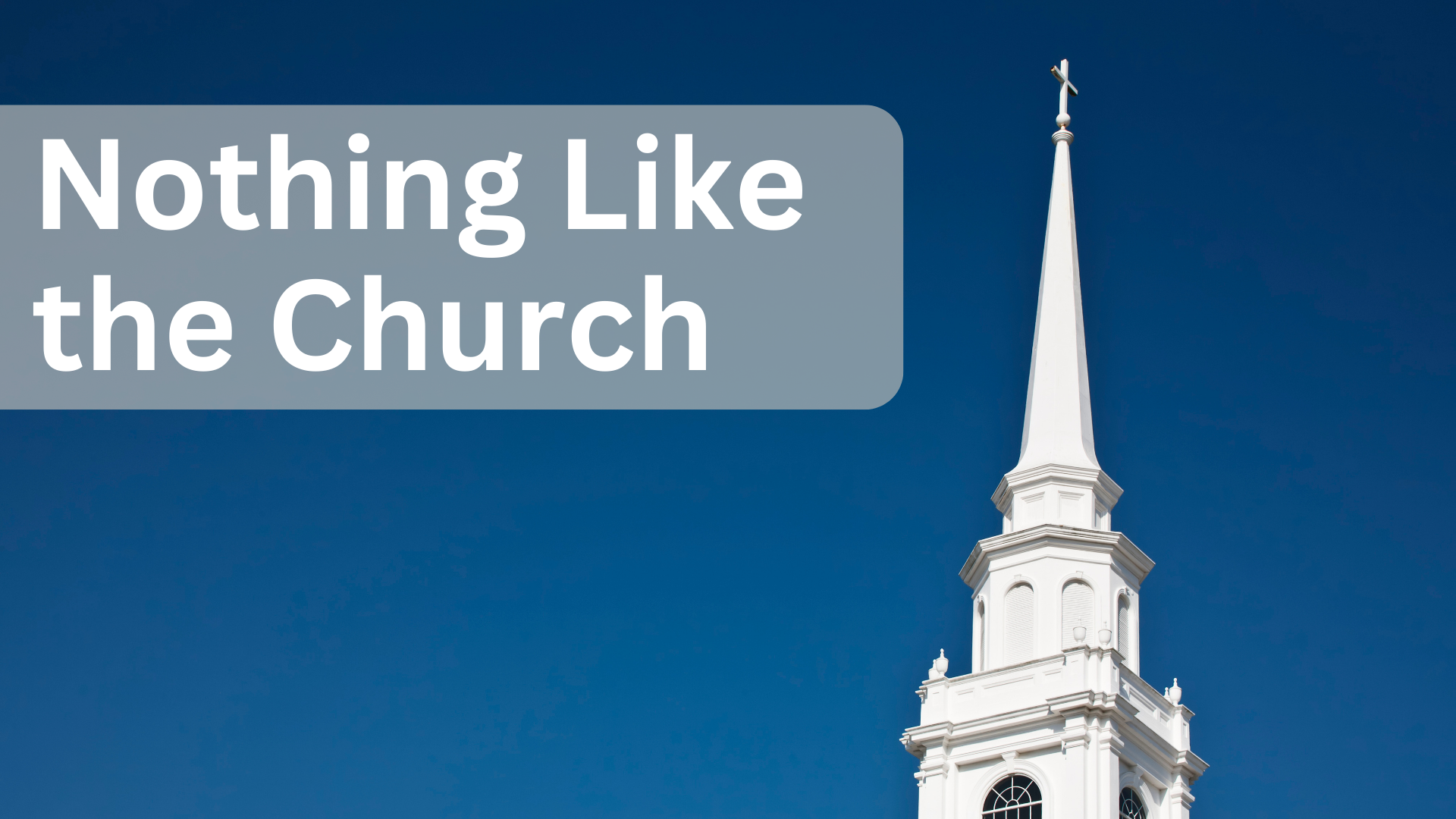Happy New Year! The next two Sundays, I am excited to preach messages on God’s love for His church and the importance of church membership. It’s my burden that God’s people love and enjoy the church as He does.
Last summer, the Voice magazine of IFCA, International published an article that I wrote on the uniqueness of the Church. I am posting it here as a way of sharing my heart.
What’s so important about church? Why would our church membership covenant expect members to promise to “give it sacred preeminence over all institutions of human origin?” Say, what? Even over the kids’ local soccer league?
During the four decades since my ordination to pastoral ministry, it has never been easy to get individualistic Americans to grasp the priority of commitment to a local church. And now, the past two years, it seems harder than ever. A great many people have stopped attending church—as many as one third by some estimates (Collin Hansen and Jonathan Leeman, Rediscover Church, Wheaton: Crossway, 2021, p. 11).
Even before the pandemic, researchers noticed that those attending church were less faithful. Thom Rainer observed that “the number one reason for the decline in church attendance is that members attend with less frequency than they did just a few years ago. For example, if 200 members attend every week the average attendance is, obviously, 200. But if one-half of those members miss only one out of four weeks, the attendance drops to 175… Of course, the heart of the problem is not declining numbers but waning commitment” (The Number 1 Reason for the Decline in Church Attendance ... - Lifeway Research, https://research.lifeway.com/2018, accessed 4/11/22).
A recent study observed, “It’s not as if COVID-19 suddenly convinced Christians they didn’t need church. Millions had already made that decision even before gathering involved online registration, social distancing, and masks. COVID-19 however, accelerated the long-trending separation between personal faith and organized religion” (Hanson and Leeman, p. 11).
Yet, we follow a Master who promised, “I will build my Church” (Matthew 16:18). That promise is what makes the Church unique: Jesus did not promise to build an educational institution, a mission agency, a judicial system, a business, a social club, or an entertainment industry. What Jesus is doing in the world today is building His Church.
I don’t say this because I am a pastor. Actually, I became a pastor because God showed me that truth. Jesus Christ has only one Bride. Be careful how you talk about a someone’s wife. Her husband loves her. With all of her flaws, the Church is precious to Christ—so precious that He died for her!
Our challenge as Church leaders is lift up Christ’s vision of His Church, to call people to see His bride through His eyes. Only then will they grasp the uniqueness of the Church and their part in it.
UNIQUE INSTRUCTIONS
In 1 Timothy 3:14-16, Christ’s Apostle Paul provided a powerful vision of the uniqueness of the Church. He began by referring to our unique instructions, “These things I write to you, though I hope to come to you shortly; but if I am delayed, I write so that you may know how you ought to conduct yourself in the house of God, which is the church of the living God.”
I am thankful that the Church’s apostolic instructions were written clearly in black and white. Paul could not immediately come to Ephesus, where Timothy was serving as pastor; so under the inspiration of the Holy Spirit, he recorded unique instructions for the Church.
These instructions were absolutely authoritative for Christ’s Church. The phrase “how you ought to conduct yourself” used the terminology of obligation. These were not matters for debate but for obedience. The “you” in this sentence is plural, making it clear that the authoritative instructions were not just for Pastor Timothy, but meant to be passed on to and heeded by the entire Church.
Note also that these instructions were extremely practical. “How you ought to conduct yourself,” in this epistle had already included the issues of false and true doctrine, prayer, women in the church, elders, deacons, and wives of church leaders. And there were many more practical issues about to be addressed in this inspired manual.
“How to do church” has become a topic for much creativity, flexibility, and hot debate. The Bible does leave local churches worldwide great freedom in many arenas in various cultures. That does not mean, however, that everything is up for grabs. We need to know and understand God’s clear Scriptural absolutes in the New Testament that instruct His Church. And, it is also important to distinguish these absolutes from areas of freedom or preference.
People frequently come to me as a pastor to ask my opinion about the latest hot button issue that they have heard being discussed related to church life. I often say something like this: “My opinion isn’t that important. But God’s Word is our inerrant authority. Let’s check what He has to say about this because we are only as correct as we agree with the Bible.”
UNIQUE IDENTITY
Next, notice how Paul uniquely identifies Christ’s Church in 1 Timothy 3. “But if I am delayed, I write so that you may know how you ought to conduct yourself in the house of God, which is the church of the living God, the pillar and ground of the truth” (3:15).
First, our identity involves whose we are: “The Church of the living God.” Christians belong to God Himself, because He made us and He purchased us by redemption. Peter’s great confession stated, “You are the Christ, the Son of the Living God.” Jesus had taken the disciples to Caesarea Philippi, a center of idolatry and the worship of lifeless deities. There He asked them, “who do you say that I am?” (Matthew 16:15). Peter got it right, because Jesus truly was the Messiah and God the Son in the flesh—not some dead god, but the living Sovereign of the universe. To be identified as belonging, not to a lifeless religion, but the only living and personal God, makes the church unique in the entire universe.
Second, our identity involves not only whose we are, but also who we are as “the household of God” and “the Church.” The household of God is His family. The eternal God is our Father and we are His loved children. The triune God is inherently relational—a Father who loves His Son motivated by their Holy Spirit who stirs up more and more love. “God is love” and made an eternal plan to share that love with the likes of us. Thus, Jesus prayed to His Father, “I made known to them your name… that the love with which you have loved me may be in them, and I in them” (John 17:28). This is why going to church should feel more like a loving family reunion than a lecture hall.
Pastor Ray Ortlund recently commented on the relational aspect of being the family of God: “Jesus did not come into this world to save isolated individuals scattered here and there. He came to gather to Himself a new community—a new kind of community, a beautiful community, set apart by God’s grace, here in a world driven by idolatry and seething with rage… Original, apostolic, authentic Christianity is, in the wisdom of God, richly communal. Our relational solidarity together is not an optional frill for extroverts… It’s our overt love for one another that makes Him more visible in the world today (John 13:24-25)… Personally, I can’t imagine trying to walk this earthly path to glory except shoulder to shoulder with other fainthearted, weak-kneed stumblers like me” (Who Helps You Enjoy God? Christian Hedonists in Honest Community | Desiring God Ray Ortlund, http://desiringgod.org/4/5/22, accessed 4/16/22).
1 Timothy 3:15 also clearly identified us as “the Church.” The Greek term, ekklesia, means “a called out assembly.” We are called out of the world by Christ, belong to Him, and should act accordingly. Notice that the term “assembly” is part of the definition of “Church.” This got complicated during COVID. I am thankful to be part of a team of elders who, after an initial shut-down, wanted to regather (with some reasonable protocols) as soon as was practical.
They were burdened to follow Hebrews 12:25, “Not forsaking the assembling of ourselves together…” Jonathan Leeman expressed it like this: “Jesus organized Christianity this way. He means to center our Christianity around regularly gathering together, seeing one another, learning from one another, encouraging and correcting one another, and loving one another. Spiritual things happen when Christians stand elbow to elbow, breathe the same air, join our voices in song, hear the same sermon, and partake of one bread (see 1 Cor. 10:17). You look around and think, I’m not alone in this faith” (Hansen and Leeman, p. 49).
UNIQUE MESSAGE
In 1 Timothy 3:15-16, Paul next referred to the Church as the “pillar and ground of the truth” and proclaimed, “without controversy, great is the mystery of godliness: God was manifested in the flesh…”
Christ’s Church is the guardian of a unique message. “Pillar and ground of the truth” pictured God’s people upholding God’s truth. This is why doctrine matters. Was Jesus truly God? Is He the only way to God? Does God want you healthy and wealthy or holy even if you are poor? I love our church’s motto, which was in place before I arrived but is still relevant—“the Bible as it is for people as they are.” Truth matters and the Bible is the source of the truth that every human desperately needs.
In verse 16, Paul then launched into what many consider to be an early Christian hymn about the deity and ministry of Christ. He introduced it with the expression, “Without controversy, great is the mystery of godliness” or as in the ESV, “Great indeed, we confess, is the mystery of godliness.” The Greek word for “great” here was mega, referring to something large in scope and significant in importance. Nothing is of greater importance than the mega-truth on which the church is built—God became a man. Paul called it a “mystery” because it arrived by special revelation of God, unknowable unless God made it known. It was the mystery “of godliness” because it changes our daily living if we truly embrace the reality that Jesus is God incarnate, king of kings and Lord of lords.
In hymn-like form, the Apostle summarized the message about Jesus: “God was manifest in the flesh, justified in the Spirit, seen by angels, preached among the Gentiles, believed on in the world, received up into glory.” This is still the Church’s unique message and its all about Jesus, the Son of God and Savior of all nations.
What is God doing in the world today? He is calling out a people for Himself from every people group, language, and nation as His Church takes its one-of-a-kind message to those who have not yet heard.
UNIQUE GUARANTEE
Christ has only one Bride; but it is worldwide, cross-cultural, and unstoppable. The one who said, “I will build my Church” also promised, “The gates of hell will not prevail against it” (Mt. 16:18).
Christ’s Church is absolutely unique—in its instructions, identity, and message. All who receive Him by faith are members of His Body. Every local church is to be a visible expression of our Him as our head and we as His hands, feet, and mouthpiece in this dark world.
Once we have His view of His Church, His Body, His bride, we will understand that “the Christian life is the churched life” (Mark Dever, Understanding Church Leadership, Nashville: B and H Publishing Group, 2016, p. v). We will be thrilled to be part of what God is doing in the world today—calling and building “the Church of God, which He purchased with His own blood” (Acts. 20:28).


